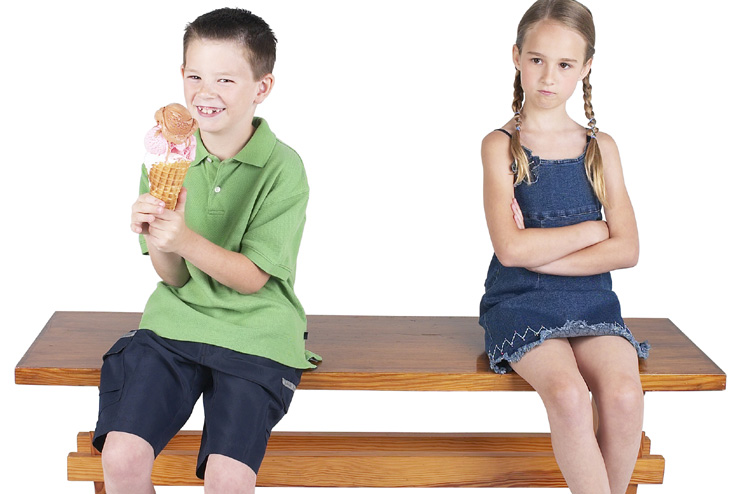It is more common for the children to compare with their classmates. Children start to develop envy towards their siblings for many things ranging from the accessories to their parents’ attention.
How long this jealous is good for children? Jealous children are at the risk of many psychological problems. It is the responsibility of the parents to take initiative in helping the child deal with the jealousy. It may collapse the strengths and abilities of your child.
This article discusses the reasons for the jealous in your child and its negative impacts on the child development. It presents the ways to deal with jealous child.
What is Jealousy in Your Child?

It is a negative emotion that may come inevitably in your child’s life. This feeling may aris towards their classmates, friends, or siblings. Jealous arises in your child in the presence of another child of nearly the same age.
Your child may feel jealous of their newly born sibling. They may fear that their sibling may get more love and attention. Deb Cohen, assistant director of the center for the parenting education in Abington says that the Jealousy is a normal emotion.
Types of Jealousy:
Understanding the type of jealousy helps you to deal with it using the effective ways:
1. Material Jealousy:
The jealousy that arises when you kid finds anything new with their friend. If your child come across this type of Jealousy, help them to understand that different families have different standards of living and priorities. Try to explain to your child the broader perspectives of the families that some may be wealthy and some other comes under the middle class.
Try to shift the attention of your child away from the material goods and the riches. Teach them some moral values that describe the importance of the family values.
2. Academic or skill jealousy:
This jealousy arises when the kids come across their peers’ academic or extra curricular skills. Make your child to understand that the interests of each person may vary. Help your child to recognize their skills and work for them instead of worrying about the skills of the others.
3. Social Jealousy:
When your child grows, social drama impacts them greatly. Whether your kid feels disconnected or leftover because their friends had a left over with out them. As your child grows you might encounter sudden changes in their behavior.
The thumb rule while dealing with the jealous child is that their feelings are never discounted. Provide your child a room where they can elaborate their wishes instead of just saying “Yes” or “No” questions.
4. Sibling Jealousy:
This is the most common form of the jealousy that every family might encounter. A constant presence of the sibling who is more smarter than them and seeking the more attention may make your child to feel jealousy.
Celebrate the skills and the abilities of the each child and it is your responsibility to acknowledge and encourage the attributes and talents of the each child. Sibling jealousy is quite normal. Proper parenting techniques can help you deal effectively with the sibling jealousy.
Behavior Of The Jealous Child:

You may notice the signs of jealousy in your child while they are playing with their friends. Your child may hit their friends out of jealousy pretending that it is a part of the play.
In adulthood, jealousy is more obvious while talking about the others which may delay their progress. Jealousy mainly occurs because of the aggression, clinginess, comparison, and ignorance.
Here are a few signs of Jealous behavior in your child.
1. Your child starts to feel mentally insecure:
Mental insecurity is the most common cause of jealousy. Children may feel mentally when they have the newborn in their home. They may get surrounded by the thoughts that the love and attention gifted by their parents may be diverted towards their sibling. To express this insecurity, your child may cry more often or afraid to separate from you at the bedtime or at the social gathering or when you leave them at the daycare centers.
2. Rude and careless behavior with the friends and siblings:
Aggression is one of the major signs of jealousy. Angry is the way that the children use to show their emotional jealousy. Your jealous child may start to behave rudely with the other children and sometimes may tend to bully their friends. Jealous children are more likely to harm their friends and siblings.
3. Jealous children start comparison:
Comparison is one of the signs of jealousy. Jealousy may push your child to compare himself with the others. If they notice that they do not have the specific item, they start raising the tantrum.
4. Often try to create the troublesome situations:
What the Jealous child always require from you is the love and attention. They tend to increase their clinginess in proportion with their jealous towards their sibling. If they see you spending time with the other kid, they start to create troublesome to get your attention.
For example, when you are trying to make the younger kid sleep by using the comforting techniques, the other kid being the jealous may start to make the noise by shouting or by dropping the toys.
5. Child may turn possessive and suffer from depression:
The kid who failed to show his anger may develop depression, frustration, and fear. Being felt unwanted, they start to become over possessive about their parents, friends and their own belongings.
Try to respond to the needs of your child with the unconditional love, if you notice these kinds of behavioral issues in your child. Handle your child’s state of insecurity with some patience. Keep your child in the track of discipline and make them understand that it is not fair to hurt the feelings of others.
Impacts of Jealousy on Child Behavior:
Jealousy is the common behavioral problem in both the adults and the children. Jealousy in adults will poison the relationships and may have negative impact on their life. Most of the adults can easily handle their jealousy to promote their well-being.
Kids are new to this emotion and they do not know what to do. If this behavior is left untreated, it may lead to the following negative consequences in your child:
• Retarded self esteem
• Aggression on others
• A feeling of helplessness and abandoned
• Child may become bully
Causes of Jealousy in Children:
Jealousy may start right from the childhood due to their parents and some other external conditions. Certain behavior ignited by the parents might ignite the jealousy and the competition between their children.
Here are some of the parenting mistakes that induces the jealousy in child:
1. Too much pampering:
Too much pampering may spoil the child. This makes them feel unconquered at home. Whenever a new child comes into their family or they come across the friend who is more powerful the child may feel insecure. He feels that newborn or friend should pay for their behavior.
Children often suffers from the depression, when they did not get what they want and their inferiority grows with them.
2. Over protection:
When an overprotective child is allowed to face the challenges suddenly, they feel that they are being left in the wilderness. They might feel timid and shy and become reserved more often. Whenever they see a confident child, they tend to become more jealous.
3. Authoritarian Parenting:
Overcontrolling is the more common mistake that the parents do. Laying down the strict rules without explaining the reasons may impact the behavior of your child. These rules may make the child to lose their confidence and feel less worthy.
4. Creating unhealthy competitive environment:
Forcing the child to do the same activity and comparing their results may create the unhealthy competition for your child. The strengths and capabilities may vary with the children and insisting the child to do the same activity with the same precision may create jealousy in them.
5. The order of the birth:
Some parents pay the attention to their children based on their birth order and they fail to treat the children equally. With the arrival of the new child, the older kid may feel disconnected from their parents.
6. Comparison with the others:
Comparison with the other kids may make the child to feel jealousy and often become aggressive. Comparison may bind the abilities and the self-confidence of your child. Praise your child for their efforts irrespective of the results.
How To Deal With The Jealous Child?

Before your try to deal with the jealousy in your child, make sure that you are not jealous towards your siblings, friends, and family members. You could not be able to deal with the envy in your child unless you are away from it.
Here are a few tips to deal with the jealous child:
1. Turn their jealousy into goal:
This is one of the best ways to parent a jealous child. Offering your child some positive energy is a great way to curb their negative feelings that make them to work for their goals. If your child is depressed with the good grades of their friend, motivate your child and help them to overcome their weakness.
Help your child to put their attention in the right path and make them to learn the things which they do not know. Explain your child clearly that there is no shame in learning the things from the others irrespective of their age. Learning is a great quality to boost the skills and abilities.
2. Respect their feelings:
Help your child to identify and express their emotions or feelings that arouse due to a specific situation. Empathize with them and help them to turn normal soon.
The way that you respond to your child’s feeling will speak them how they are important to you.
If your child is unable to express their emotions you need to recognize them. Paying close attention to their facial expressions, gestures, sounds, and other communication can help you identify their feelings. Talk to them when they are in the receptive mood.
3. Pay attention to your child:
Some other hidden and underlying behaviors may contribute to the jealousy in your child. Talk to your child to diagnose the root cause for their jealousy. There are some cases that your child may have low self esteem and low self confidence. Help your child to enhance their self confidence. Work with your child to recognize the aspects that make them jealous towards others.
4. Do not compare your child with others:
Comparisons may further make your child weaker and lose their confidence. Comparisons often make your kid to feel bad about themselves and it impacts their behavior. When the child is compared, they are at the risk of anxiety, depression and the substance. Give your child room to know their abilities and frame their career. Praise them for their efforts and hard work towards the specific task.
5. Help your child to promote the cooperative behavior:
This is one of the best ways to teach your child not to be jealous. Mold your child in a way to be more cooperative with the other kids. Give your child to share moments, and help together. The active involvements of the parents can make the huge different in the behavior of your child.
6. Highlight the strengths of your child:
It is more common that the children compare themselves with the other children. Offer your child a chance to explore their abilities and appreciate them for their efforts. Analyze the performance and the energy levels of your child which are the key to analyze their strengths.
7. Talk to your child about the jealousy:
When your child is struggling to cope with the jealousy, it is the right time to speak them about the jealousy. Help your child to view the skills of their siblings, friends, and classmates as the motivation to boost their abilities instead of developing envy on them. Tell your child to work closely with the people whom they feel are good at certain abilities. This helps them to know and learn many unknown things.
8. Make them feel your love and affection:
It does not mean that you don’t love your child. They should feel all the love that they need at this stage. Any guidance that is coupled with the love and caring can help your kid to fix the things easily at the early stages before they worse and impact their behavior.
9. Inculcate the positive behavior:
Try to make your kid stay away from the things that may generate any kind of jealousy in your child. The feelings of love, sharing, and caring can be taught from the childhood. Try to turn the jealousy into positive. Instead of feeling envy for what do not have help them to develop what they have.
10. Stop over praising your kid:
Research shows that there are positive effects or praising the child but the results may very depending on the kind of praising that you are dishing out to your child. A sincere praise can motivate your child. Ensure that your praise should focus on their performance, autonomy and it is purely free from the social comparison. It should covey them attainable standards and expectations.
11. Talk to them the importance of sharing:
Help your child learn sharing by offering plenty of time and the opportunities to share. Sharing not only help your child make friends but also helps them to eliminate the jealousy. Sharing helps your child to develop compromise and add fairness to their attitude. Children who share learn to take turns and negotiate. They know how to cope with the disappointment.
Activities for Jealous Child:
Here are a few activities to help your jealous child:
1. Involve your child in group activities:
Involve your child in some group activities and games and help them to improve the cooperative behavior instead of jealousy. Allow your child to do crafts in groups and let them to share their creativity and knowledge and learn new things from their friends. These group activities will also reinforce the helping nature in your child.
2. Scavenger hunt in teams:
Scavenger hunt can give your kids lots of joy. You can plan this game even with two small groups. Create a list with different shapes and ask the children to collect the things matching the shapes in the list. This activity can foster their cooperative skills. Praise each team for their efforts.
3. Plan a visit to the nursing home:
Schedule frequent visits to the nursing home with some home made dishes and cookies bags. Visit to the nursing homes will help your child develop love and respect towards the adults which could be a great chance to eliminate jealousy.
4. Pass the cookies:
Give your child a handful of cookies and ask them to give one to each person in the family. This teaches them art of sharing and its beauty in the real in life. Positive behaviors will help them to give off the jealousy.
5. Arrange play dates:
Arrange the play dates and teach your child to share their toys with their friends. Teach them to offer warm welcome to their friends with some snacks.
In conclusion, it takes some time to shield your kid from the jealousy as it is more common even with the adults. Stop comparing and don’t allow them to compare their weakness to other’s strengths. Check your habits to route your child into the right path.









































